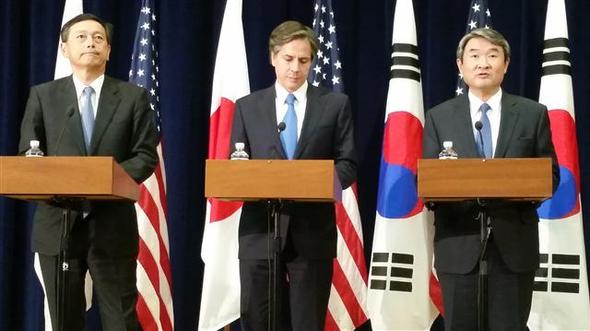Posted on : Apr.20,2015 17:08 KSTModified on : Apr.20,2015 17:08 KST
 |
From right to left,Vice Minister of Foreign Affairs Cho Tae-yong, US Deputy Secretary of State Tony Blinken and Japanese Vice Foreign Minister Akitaka Saiki hold a joint press conference after their meeting at the State Department in Washington D.C., Apr. 16. |
The US and Japan confirmed that they will respect South Korean sovereignty when Japan exercises its right to collective self-defense, but the two countries decided not to specify this in their bilateral defense cooperation guidelines, reports say.
The Hankyoreh confirmed that the US and Japan communicated their intentions to South Korea during the Defense Trilateral Talks (DTT), which were held at the Pentagon on Apr. 16 and 17. Deputy minister-level officials from the Defense Ministries of the three countries participated in the talks.
“The Guidelines will be revised within the framework of the U.S.-Japan Alliance. The officials agreed that it is important to promote this initiative in a manner that contributes to regional peace and stability with transparency and in accordance with international law, including the respect for sovereignty of third countries,” the three countries said in a joint press statement released immediately after the talks.
Since South Korea is reportedly the only country that has expressed concern and taken issue with the effect that the revised guidelines might have on its national interest, the “third country” mentioned here is presumed to be a reference to South Korea.
However, the expression appears to be excessively broad and ambiguous, since “third country” could be taken to mean not only South Korea but also other countries such as China.
Furthermore, this does not satisfy the South Korean government’s request that the guidelines specify that Japan must receive the prior approval of the South Korean government before the Japan Self-Defense Forces (JSDF) engage in military activities that fall in South Korea’s territory - whether land, sea, or air - or that could have an effect on the Korean Peninsula.
“During the meeting, the US and Japan said a lot of things with South Korea in mind, but they apologetically explained that they could not mention a specific country in the guidelines,” a military officer said.
“We won’t be able to know for sure how this will exactly be expressed in the guidelines until they are announced at the end of this month,” the officer added.
“Apparently, the US and Japan said that they would be unable to mention specific countries in the guidelines. While only South Korea is taking issue with the guidelines for now, the US and Japan appear to have considered the fact that if Vietnam or the Philippines take issue with the guidelines in the future, then all of these countries would have to be specified as well,” another source said.
South Korea, the US, and Japan also agreed to continue working-level deliberations to more effectively implement the information sharing agreement related to the threat posed by North Korea’s nuclear weapons and missiles.
This trilateral arrangement, which was signed in Dec. 2014, is expected to serve as a basic framework for cooperation on missile defense between the three countries. In addition to deterring provocations by North Korea, the three countries also discussed ways to cooperate in non-traditional areas of security, including humanitarian aid, disaster relief, anti-piracy operations, and responding to the Islamic State.
By Park Hyun, Washington correspondent and Park Byong-su, senior staff writer
Please direct questions or comments to [english@hani.co.kr]

www.hani.co.kr/arti/english_edition/e_international/687607

 www.hani.co.kr/arti/english_edition/e_international/687607
www.hani.co.kr/arti/english_edition/e_international/687607


